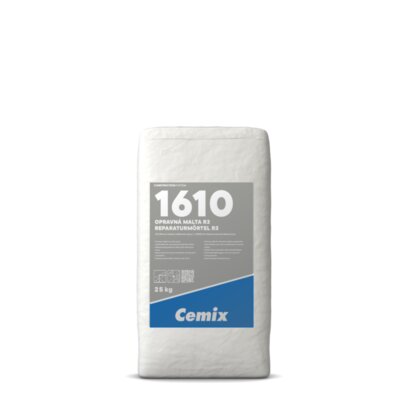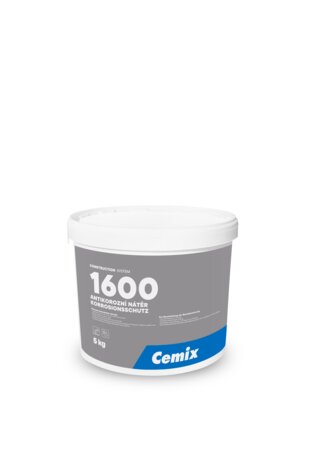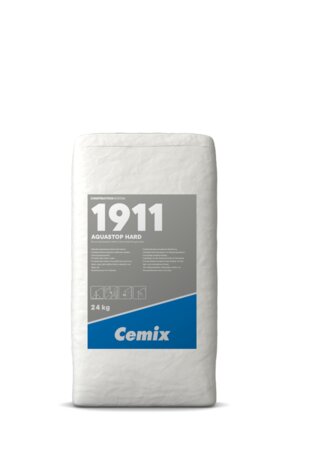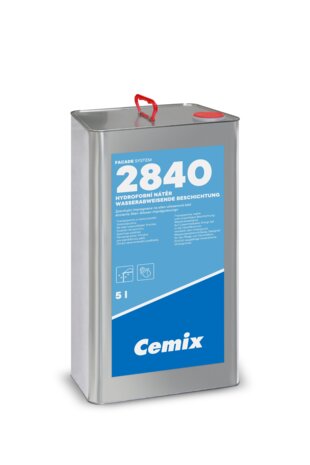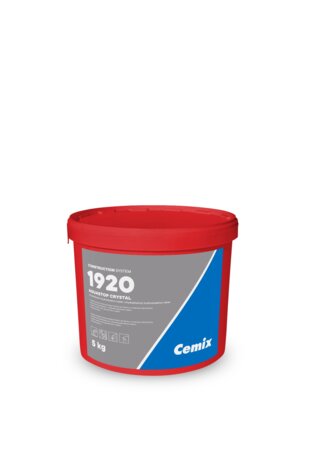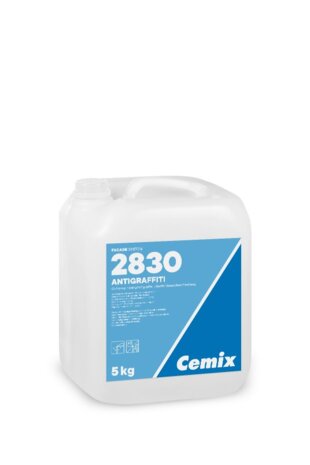1610
REPAIR MORTAR R3
Formerly While stocks last. Replaced by 1615.
Abrasion resistant and thixotropic mortar for application in challenging situations.
With polypropylene fibers
- R3: >30MPa for statically relevant repairs.
- Contains plasticizing additives: thixotropic. Ideal for manual repairing work.
- Good adhesion to concrete and steel: suitable for repair of concrete, reinforced concrete structures and precast concrete. Can be applied overhead up to 40 mm layer thickness. Can be used without contact bridge.
- Contains polypropylene fibres: Strongly resistant to abrasion.
- High resistant to frost and chemical de-icing agents.
- Dimensionally stabile: crack-reducing.
- One-component: Only add water.
Area of application
- Outdoor: floor + wall + ceiling
- Indoor: floor + wall + ceiling
Processing method
- For hand and machine processing
- Fiber-reinforced PCC mortar suitable for repairing concrete and ferro-concrete structures or precast concrete on vertical, overhanging and horizontal surfaces of walking surfaces
RECOMMENDED SYSTEM PRODUCTS
Processing details
Learn more about technical details for processing this product.
Substrate requirement
The substrate must comply with the applicable standards, must be solid, free of loose particles, free of dust, paint, residues of demoulding agents and efflorescence. It must be sufficiently rough, dry and evenly absorbent. The surface shall not be frozen and water-repellent. The minimum substrate cohesion shall be 1,5 MPa and the concrete quality C 20/25. Coat the exposed and cleaned reinforcement with Cemix protective coating.
Substrate preparation
Remove any disturbed, hollow-sounding, dirty or otherwise contaminated concrete and low pH concrete so as not to create micro-cracks in the substrate. Pressure wash the entire surface to be repaired to remove loose particles, dust and dirt, and open the surface completely. Before applying the material, moisten the substrate well by soaking it several times for at least one hour before application. Just before application, remove excess water from the surface of the area to be repaired to achieve a matt concrete appearance.
Preparation of the mixture
Směs připravíte tak, že nejprve smícháte 2/3 suché směsi s plným objemem vody. Míchejte ji 2 min. a poté za stálého míchání přidejte zbývající suchou směs a míchejte 3 min. do požadované konzistence. Smíchejte do homogenní směsi bez hrudek. Směs nechte odpočinout. Poté znovu krátce promíchejte. K míchání použijte pomaloběžný pádlový mixér s maximální rychlostí 800 otáček za minutu. K míchání směsi použijte pitnou vodu nebo vodu odpovídající normě EN 1008.
Water demand

| Quantity | Liters (Min) | Liters (Max) |
|---|---|---|
| 1 kg | 0,12 l | 0,128 l |
| 25 kg | 3,00 l | 3,20 l |
Mixing


Processing instructions
Thorough adhesion of the first layer over the entire surface is a prerequisite for achieving high final adhesion. The first step is to make a contact layer - work the mortar into the pores and irregularities of the substrate using a trowel or brush with shorter bristles. Then immediately apply the required layer, taking into account the recommended thickness, using a suitable technique such as stretching so that no unfilled areas are created.
For the incorporation of the first contact layer of material, the mortar may be prepared thinner, with the amount of mortar water at the upper limit of the specified mortar water interval.
If the repair cannot be made in one layer, it is recommended to start the repair at the deepest point and roll it out so that the last layer is always continuous over the whole area (preferably of constant thickness). Each layer should be finished with a consistent unbroken but not smooth surface and protected temporarily from rapid drying (e.g. by covering with PVC sheeting or damp cloth). The application of each layer should be started immediately after the previous layer has dried. Finish the surface with a steel or polystyrene trowel or Cemix 1640 fine reprofiling mortar.
Application thickness

| Minimum layer thickness | 5 mm |
|---|---|
| Recommended layer thickness | 10 mm |
| Maximum layer thickness | 40 mm |
Consumption

Yield
| Material consumption | at | unit | Yield |
|---|---|---|---|
| 25 kg | 10 | MM | 1,19 m² |
Working time (potlife)

25 min
Treatment after application
Avoid the negative effects of sun, heat, humidity and draughts. Protect from frost and rain. Direct heating of the surface is prohibited. Keep wet for 1-2 days after application.
Tool and cleaning instructions
Wash off tools with water immediately after finishing work. Clean dried residues mechanically.
Technical parameters
| Main binder | Grey cement |
| Made of material | Mixture of aggregate, Portland cement and refining additives. |
| Flammability class | A1 |
| Max. grain size | 2mm |
| Full load after | 28 d |
| Compressive strength 28 days in N/mm² | 30 N/mm² |
| Flexural strength 28 days in N/mm² | 7 N/mm² |
| Chloride ion content in % | 0.05 |
| Dry bulk density in Kg/m³ | 2150 |
| Wet density in Kg/m³ from | 2200 |
Download
Contact: Can we help you?
Ask us your question. Write to us whenever you want. We will reply within 48 working hours.
Telephone 800 022 848
Contact us on the toll-free Customer hotline
- Opening hours: weekdays 7:30 a.m.–3:00 p.m.
- Email: info@cemix.cz
